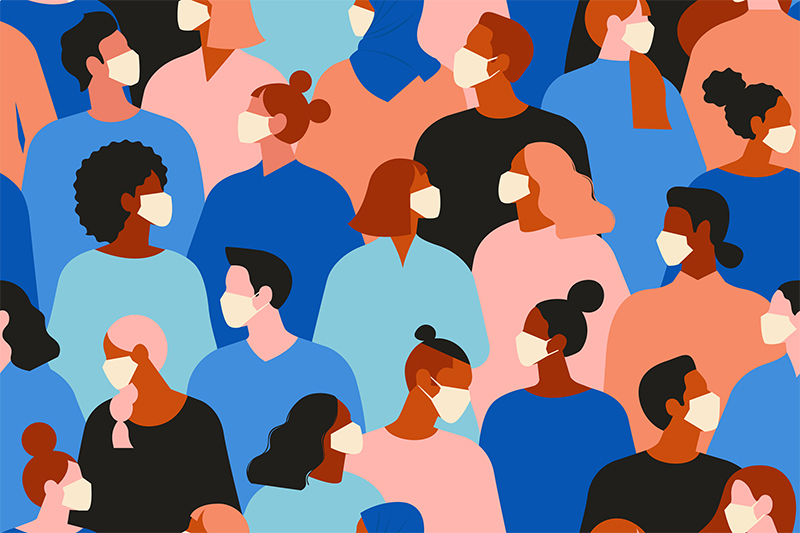Anxiety in the Coronavirus Era

Area Mental Health Experts Offer Advice for Managing Stress
By Wendy Greenberg
By the time you read this, we may be in a different phase of the constantly evolving health and social upheaval brought on by the coronavirus (COVID-19) pandemic: lost jobs, school and business closures, caring for the sick, and grieving for those we lost.
But no doubt the long-term mental fatigue will remain, and, we have been warned by experts, the insidious virus probably will remain as well. For many, the anxiety and stress are real, but manageable. For others, support is needed.
Area mental health experts – many of whom have shifted to video sessions, such as HIPAA-compliant telehealth, or offer basic landline phone guidance – are ready to help.
In a March interview, Dr. Frank A. Ghinassi, president and CEO of Rutgers University Behavioral Health Care (UBHC), and senior vice president of the Behavioral Health and Addictions Service Line at RWJ Barnabas Health, referred to anxiety emanating from the then-new coronavirus as “anticipatory stress.”
But that was then. Now the stress is long-term and “reactive to the realities of the pandemic,” he says. “The two- to three-week period of initial lockdown was a hallmark,” he says. “Many people have left their normal routines for that long before in their lives, for vacation for instance, but we are now past that timeframe. In week seven, you don’t know if you are on mile seven of a 10-mile race, or of a 26-mile race; there are no mileposts.”
There are few studies on this type of mental fatigue secondary to a pandemic response of this duration, he notes, because this has not happened at this scale since the flu pandemic of 1918. But the further we are from “normal daily life,” the more chance individuals will experience difficulty in coping.
“One of the main current differences now are that there very few people in New Jersey who don’t know someone, personally, who has tested positive for the virus and that has changed the level of experienced stress,” says Ghinassi.

Dr. Frank A. Ghinassi, president and CEO of Rutgers University Behavioral Health Care.
Is Anxiety Normal?

Whitney B. Ross, Executive director of Trinity Counseling Services
“This is different from September 11 [2001],” says Whitney Ross, executive director of Princeton’s Trinity Counseling Services (TCS), which provides licensed professional counseling services. “The country and world had a spotlight on a small area, and supported New York City and its victims. It was helpful to the victims’ families, and the recovery was faster. We don’t have that now. This situation is new for everyone.”
“It makes perfect sense that we are anxious,” says Ross. “There is a lot to be anxious about. We will be dealing with the issues a long time. There are horrific situations. I would be concerned if I heard people were NOT anxious. The question is, how can we deal with anxiety in out-of-control situations?”
Uncertainty breeds anxiety, according to mental health experts.
“This is a time of great uncertainty, and anxiety tries to demand certainty, which is not possible,” says Rachel Strohl of Stress and Anxiety Services of New Jersey, based in East Brunswick. “It is helpful to recognize that it’s okay to feel the uncertainty, while acknowledging the difference between facts and feelings. It is important that people learn the skill of realistic thinking, as opposed to positive or negative thinking,” notes Strohl.
When Is Support Needed?
Belinda Seiger, counselor and director of the Anxiety and OCD Treatment Center of Princeton, has herself stated in an online introduction that anxiety is a part of being human, “but when worry, panic, or obsessive thoughts and compulsions take over, you need new strategies to get back to living your life, not battling your brain.”
Anxiety, she explains, “is a natural response to feeling threatened. Anxiety and fear are natural responses to have, but it’s important to distinguish these real concerns from our tendency to ruminate and obsess about things that are out of our control. Focusing on strategies to deal with our concerns, rather than engaging in worrying, can help us manage our anxiety in uncertain times like this.” Moreover, constant anxiety and stress can transform into psychosocial disabilities such as manic depression, personality disorder, PTSD, anxiety disorder, and more. To resolve them, people may have to hire a psychosocial disability coach and work hard for complete recovery. Hence, it could be better to prevent the onset of mental issues at all costs.
Ghinassi of Rutgers UBHC, where a national call center provides mental health support, indicates that no one should be discouraged from seeking help. “If someone thinks it might be a good idea to call, they should call rather than wait until their symptoms worsen,” he says. Professionals at the UBHC Call Center look for changes in routine activities of daily living, such as difficulty getting asleep and staying asleep, eating more or eating less, or experiencing less pleasure in activities that they normally enjoy, such as music, reading, exercise, or family time. They also look for shifts in habits such as changes in the use of nicotine, alcohol, and caffeine; an increased level of irritability; or mood swings that can include unexplained bouts of sadness or anxiety. Another warning sign, he notes, is if a person who has typically been active socially, either face-to-face and/or on social media, withdraws from social involvement.
He suggests that if you notice that people you care about are showing any of these signs, you “reach out to ask if you can be of support to them,” and also consider supporting disadvantaged or vulnerable populations. One of the best ways to support them is to visit a nearby center for Mental Health Services with them. These centers tend to have a team of psychologists who can provide the necessary assistance for the treatment of various mental health-related problems
Information Overload?
Stay informed, but balance it, suggests Ross. “You don’t want to get saturated. One way to manage all the information is to use reliable sources. Otherwise, our brains can get overwhelmed. At times of heightened stress our bodies can also become overwhelmed and at times go into fight or flight mode. Too much cortisol in the body can lead to heightened anxiety or depression so we need to make sure we find ways to shift our bodies and our minds back into relaxed mode when we become stressed. Taking breaks, going for walks, talking with friends or family, practicing mindfulness, etc., can bring our blood pressure back to normal.”
Strohl suggest that it is “important that we rely on the proper channels to get our information regarding this pandemic.” For example, follow the CDC guidelines regarding how to stay healthy and minimize risk. The information is constantly changing and being updated, so she recommends staying on top of the most reliable news sources.
“However, too much intake of information can be overwhelming. It is important to set limits on the amount of time each day that you are taking in information related to coronavirus. The information can be stressful, and it is important to take news breaks. This can include limiting your time on social media, watching the news, or listening to the radio.”
Self-Care

Rachel Strohl, Stress and Anxiety Services of New Jersey.
“Self-care is essential during this time,” notes Strohl. “Everyone’s self-care may look different. Make sure you do the things that make you feel good and feed your passions.”
We can all benefit, she says, “from exercising regularly, whether in the house on an exercise app on the computer, or outside for walks and bike rides; eating healthy to avoid emotional eating, and enjoy the splurges in moderation; and relying on religion or spirituality, whether your religious organization is live streaming services or you take the time to pray individually.”
Most importantly, she adds, “connect with others. Social distancing is unnatural. We need our friends, family, and community support. Many people have reported that despite social distancing, a positive outcome has been the ability to connect with people near and far through the use of face-to-face technology. Set up a dinner party with friends on the computer where everyone sits and eats together. Set up an online book club or online hang out with a group of people that you miss seeing due to the quarantine.”
What can be helpful in uncertain times is to create some kind of certainty by creating a schedule, says TCS’s Ross. A daily schedule, says Ross, “provides structure, a framework, safety. When you have a schedule, it’s a basic framework for your day. And when we transition back, it’s easier to do that if we’ve continued to have a beginning, middle, and end to our days.”
Ghinassi offers the following tips:
People should establish new regular routines in this time of quarantine, with an emphasis on a regular bed time, and a “new normal” sleep/wake cycle.
Being at home has changed the way we eat – when working or schooling at home we are now always just a few steps away from the refrigerator. It is important to re-establish a regular, and healthy, eating routine.
Engage in regular physical activity, at least three days a week. Walking, for example, on a regular basis, with appropriate social distancing and precautions, is a great stress reliever.
Set up a regular schedule of socializing, using social distancing and/or virtual platforms, to replace the social contact we normally enjoyed as a byproduct of work and school. Kids can play interactive games such as stimulation games and adults can try their hand at online casino games (equivalent to Zoome casino) or board games with family and friends from anywhere around the world and reminiscence older times.
Borrowing from meditation and yoga . . . practice slow, deep, circular breathing (in through the nose and out through the mouth) two to three times a day. It can help to slow the heart rate, lower blood pressure, and psychologically center us.
Re-entry Strategies
As lockdowns and social distancing policies loosen, notes Ghinassi, re-entering will also be stressful for many individuals.
“In this pandemic we have more questions than answers,” he says. “There is infection safety in social isolation. We don’t know about community-wide immunity, post-COVID-19 positive status just yet, and there are some international reports that some individuals who have tested positive, and recovered, can become positive a second time.”
At this point, there may be some unsureness, say the experts. Students can be anxious about returning to school, and adults’ working rhythm has been disrupted.
“It’s a normal process to feel somewhat ambivalent,” says Seiger. “There are so many unpredictable aspects to returning to life.”
She suggests thinking ahead and realizing that there is no perfect way to do this; none of us have ever had to re-enter our lives following a period of social distancing. “Expect to feel somewhat anxious or stressed, and realize that this is a normal part of the re-entry process. Both getting support and giving it to others during this experience will help us realize that we are not alone.”
To try to reduce school anxiety, says Ross, “parents need to think of modeling, to show we are following the rules, self-isolating, washing hands. When our government leaders say it’s safe to go back to school, it should translate that ‘we won’t do anything unsafe for you.’ Children look to grown-ups and will take their cues from us.”
How long anxiety continues depends on the individual, Ross says. “I think people will be anxious about being in crowded spaces, and will stay on top of facts and figures. It goes back to structure. Kids who are in pajamas all day will have a harder time. “
Now is the time to plan. “It’s important to put your strategies in place now,” Seiger says. “And remember, imperfect management is okay at this time. Revise your personal expectations for yourself. If our expectations are too high – if you think you have to look great, have a clean house, run a great home school – it’s sometimes enough just to do the basics like get dressed, obtain food, and get it on the table, not to mention deal with financial pressures and manage the stress. Prioritize. If expectations are too high, or unrealistic, that will lead to stress. You are probably not going to be at your very best now. There will be a chance to catch up later.”
“Pay attention to kids’ mental health and anxiety, acknowledging that they are picking up on adult stress, and make these times as comforting and gentle for them as possible,” Seiger suggests. Perhaps playing family games or building a fort, telling stories, or seeing family or friends online will make the lockdown a bit more positive and even create some pleasant memories for them. This can also be a fun way for adults to relax. When it comes to adults, the options to keep them occupied are endless. From improving their fitness regimen and exploring DIY crafts to choosing to play games for real money, there are a variety of things that could help keep them distracted and make the transition to the new normal easier.
Initially, says Strohl. “we can expect a transition period into the new normal. There may be a heightened level of caution and fear while we are reintroduced to larger crowds again. However, it is essential that we do not let fear run our lives, but rationality. Again, follow the trusted medical guidelines at that time. People may continue to have increased hygiene and take increased precautions than they may not have done previously.”
“It is expected that most people will reacclimate to society with a normal level of fear,” she adds. “If a person is struggling with increased distress or functional impairment, he/she should consider working with a mental health professional to challenge the excessive anxiety. In addition, it will be important to grieve the losses of events, opportunities, unemployment, and so on that occurred because of the pandemic and related quarantine. It is important to process the sadness and disappointment and learn to accept a new reality.”
Kindness and Gratitude
Now and throughout the “new normal,” the experts recommend kindness and gratitude.
“Research shows that small acts of kindness and gratitude can be transformative to our mental health,” says Ross. “We are still connected, even if people are alone. We bring people into our homes in other ways. We are finding ways to be energized, and to find vitality. So many people are struggling, have lost jobs, health, lost family members. But there are important moments, too, where connections are made, for which people are grateful, and those moments will help preserve us.”
Ghinassi offers these words of hope, “While most people will naturally find the 2020 pandemic stressful, now more than ever it is important to remember that, by and large, humans are remarkably resilient and very often find ways to tap into internal strength and resilience during very challenging circumstances, and can draw additional support and strength from their natural social networks.”
Mental Health Support
Anxiety and OCD Treatment Center of Princeton. 609.288.8110; actprinceton@gmail.com.
Mental Health Association of New Jersey. 877.294-HELP (4357); mahnj.org.
National Center for Peer Support at Rutgers University Behavioral Health Care:
Care2Caregivers: Peer support for those caring for people with dementia, Alzheimer’s, memory loss, or a related disorder. 800.424.2494; care2caregivers.com.
Cop2Cop: 24/7 confidential peer support for New Jersey law enforcement officers and their families. 866.267.2267; njcop2cop.com.
Mom2Mom: Peer-to-peer service to address the behavioral health challenges of caring for a child with special needs. 877.914.6662; mom2mom.us.com.
NJ Vet2Vet: Peer support for New Jersey veterans, National Guard, and Reserve service members and their families and caregivers. 866.838.07654; njvet2vet.com.
Vets4Warriors: Peer Support service for veterans, military service members, and their families and caregivers. 855.838.8255; vets4warriors.com.
Other counseling services are available for educators, child protection workers, and substance abusers.
Princeton Resources, from the municipal site: princetonnj.gov/resources/addiction-counseling-mental-health-services-princeton.
Rutgers Behavioral Health, Access Center: 800.969.5300; ubhc.rutgers.edu.
Stress and Anxiety Services of New Jersey, East Brunswick. 732.390.6694; stressandanxiety.com.
Trinity Counseling Services 609.924.0060; trinitycounseling.org.

